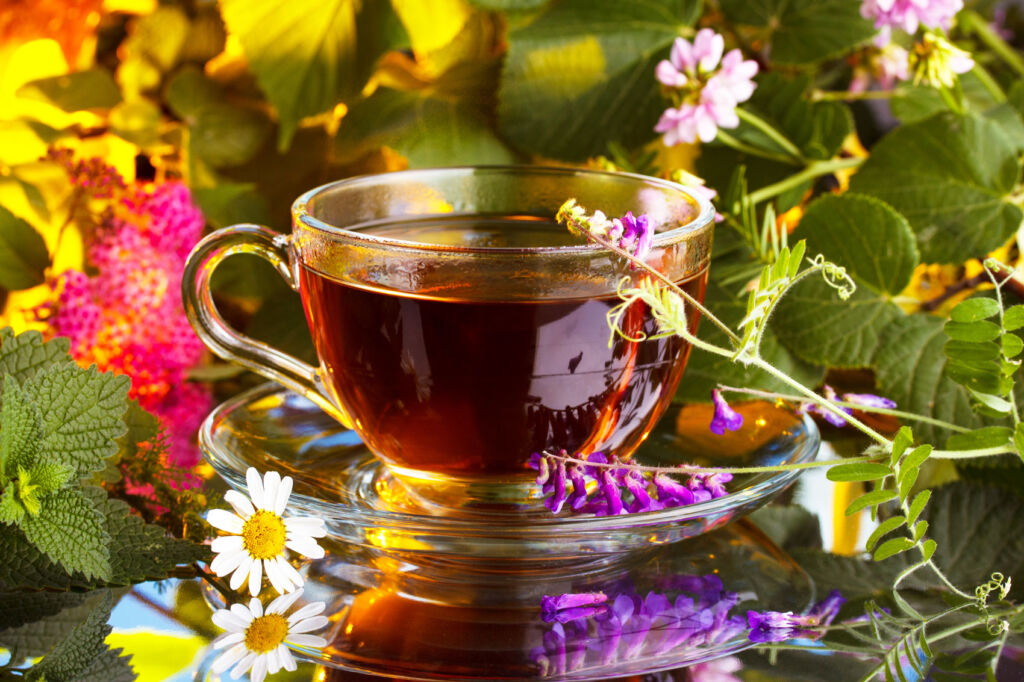
Although herbal teas often take a back seat to other beverages, they shouldn’t, as there are few, if any drinks in the world that can match them when it comes to health and wellness benefits. In this article, the Tea Advisory Panel explains many of those benefits and what non-herbal tea drinkers are missing out on.
Has your memory become poorer over the last couple of years? If the answer is yes, then you are not alone; the global pandemic has given many of us an element of brain fog. Now a new Tea Advisory Panel (TAP) research review – Herbal Infusions and Women’sWomen’s Health[1] – presents emerging evidence that certain herbal teas – German Chamomile, Rosehip and Spearmint – could help manage several key issues for women from poor quality sleep to memory loss and debilitating PMS.

Over the past two years, the many lockdowns, repetitive routines and quarantines mean that our memory function has not had to work to take in new experiences, hence our current state of brain fog. Moreover, medical experts say if you have had Covid-19, it can negatively impact your memory for up to nine months afterwards.
The study co-author and guest advisor to the independent health and wellbeing group, Tea Advisory Panel (TAP) Dr Gill Jenkins, said, “Most of us have suffered from a lack of social connection over the past couple of years, and because of the dearth of new experiences, events and dates our memories may have become more muddled. There has also been a sharp increase in levels of anxiety among women, another factor detrimental to concentration and memory retention.”
She added, “This new study examines several women’s health issues and finds compelling evidence that drinking herbal teas – German Chamomile, Rosehip and Spearmint – can boost sleep quality and in turn help memory function and low mood.”

Sleep – The Cornerstone of Good Health
It is common knowledge that a lack of sleep negatively impacts our mental and physical health. But recent figures show that the global pandemic has exacerbated the sleep crisis in Britain, especially among women, with 52 per cent saying their sleep has been more disturbed than usual [2].
Even without the harmful effects of the pandemic, the shocking truth is that women have a risk of insomnia that is around 40 per cent higher over their lifetime when compared to men [3]. Women’s sleep issues and their links to hormonal changes – be that menstruation, pregnancy, or menopause – are only just starting to be fully recognised.

Time for Tea
Leading neuroscientists have shown poor sleep can be linked to numerous fatal diseases. At the very least, a lack of sleep impairs our ability to function across the board. It is no surprise that chronic insomnia commonly co-exists alongside other serious medical conditions, such as anxiety and depression.
Women’s health expert and a member of TAP – Dr Catherine Hood, says, “Sleep is the foundation of good health. The Herbal Infusions and Women’s Health Study shows that drinking a cup of German Chamomile tea every day can aid relaxation and promote better quality sleep. The tea has mildly sedative properties that help the body regulate sleep.”

German Chamomile tea also boasts several other health benefits for women, including helping to reduce menstrual pain, PMS, and stress. The new study also shows that it can significantly reduce cholesterol and help to improve glucose, insulin, and blood lipid levels.
Making a Real Difference
The number of British people who have diabetes continues to grow, with more than 4.9 million people having been diagnosed with Type 2 diabetes,[4] and a staggering 13.6 million at risk of the condition.

Patients are encouraged to have a healthier diet and exercise in most cases. This TAP study shows that German Chamomile tea and spearmint tea can also positively affect glucose levels. Together with lifestyle changes, they can make a real difference to health.
Herbal teas contain a range of plant compounds, including flavonoids which helps to explain the many health benefits.
Herbal researcher and study co-author Dr Pam Mason explains: “Spearmint has traditionally been used in herbal medicine for a plethora of digestive disorders including indigestion, IBS and diarrhoea. She adds: “The evidence highlights that natural compounds such as these have anti-inflammatory and blood vessel dilating properties. Our findings even showed that osteoarthritis sufferers who took it regularly found that their stiffness and mobility improved.”
Other evidence of the benefits of Spearmint include:
- It helps to regulate hormone levels
- Can improve muscle and joint pain
- May reduce nausea and headache symptoms
Boosting Your Immune System
In traditional medicine, rosehip tea has long been used to help with digestive upsets because it helps to soothe the gastrointestinal tract. It contains a range of vitamins, including vitamin C and polyphenols, which are known to play an important part in immune function.
The new research review from TAP showed that rosehip extract could also help osteoarthritis sufferers – with data showing that those taking it regularly experienced significantly less pain and increased mobility. It is also thought to help those with rheumatoid arthritis. More research is needed.
Beauty Isn’t Just Skin Deep
The medical profession often neglects women’s health issues, but this research review shows that herbal infusions can significantly boost hormonal health. The latest research shows us that levels of female hormones can have a powerful effect on sleep regulation.

Rosehip tea is another herbal tea infusion that is known to reduce anxiety and boost sleep and wellbeing. Dr Pamela Mason adds it has many other health benefits too: “Rosehip tea was found to reduce menstrual pain and drinking two cups on a daily basis has been shown to help decrease abdominal fat and body weight. It has also been shown to improve the skin’s appearance by boosting elasticity and moisture.”
How You Can Beat Brain Fog
Need a cognitive boost? There are some simple ways to improve your memory function. Three top tips recommended by TAP are:
- Exercise regularly: Exercise helps our muscles to clear out harmful chemicals that may impair memory. The main benefits come in the first 20 minutes, so aim for a short exercise session every day. Regular exercise can significantly boost our ability to remember things.
- Drink herbal tea: “Try to drink herbal tea on a daily basis,” says Dr Catherine Hood. “Our study shows that even one cup a day can have significant effects on health.”
- Write things down: Ditch the calendar on your mobile and use a paper diary instead. Planning and writing events down help us to process and remember things.
The TAP Herbal Infusions and Women’sWomen’s Health Research Review also found other evidence of the health benefits of drinking herbal tea, including:
- Reduced stress levels
- Improved attention span
- Reduced inflammation

Dr Catherine Hood from TAP concludes, “To date, we have underestimated the significant impact that hormones have on women’s health. The findings of this new research review suggest that certain herbal teas, be that German Chamomile, Rose Hip or Spearmint, can have real benefits for a range of conditions.” Adding, “The emerging evidence of the benefits of herbal infusions is fascinating, and it will be exciting to see what future studies can add to our body of knowledge. Research like this into women’s health issues can only help us live longer, healthier lives.”
Find more information about herbal tea and its benefits at www.teaadvisorypanel.com.
- [1] Gill Jenkins, Christopher John Etheridge, Pamela Mason; Herbal Infusions and Women’sWomen’s Health: A Review of Findings with a Focus on Human Studies on Specific Infusions with Studies on Extracts to Evaluate Mechanisms; Journal of Nursing and Women’sWomen’s Health; ahead of print
- [2] A 2020 study by Kings College London and Ipsos MORI found that 52 per cent of women said their sleep had been more disturbed than usual during the Covid-19 pandemic, while 46 per cent of men say their sleep remained the same.
- [3] From Mong JA, Cusmano DM (2016) Sex differences in sleep: impact of biological sex and sex steroids. Philos Trans R Soc Lond B Biol Sci 371: 20150110. Women were found to have a lifetime risk of insomnia around 40 per cent higher than men. Studies are just beginning to unravel the fundamental roles female hormones play in sleep regulation.
- [4] Diabetes UK: Incidence of diabetes continues to increase in the UK, with statistics from the charity Diabetes UK showing that 4.9 million people in the UK suffer from this condition, with another 13.6 million now at increased risk of type 2 diabetes.
Read more health and wellness guides, news and features here.
![]()




You must be logged in to post a comment.